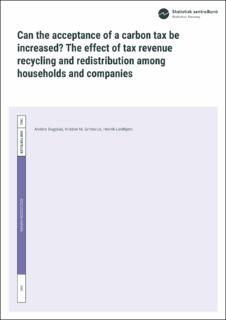Can the acceptance of a carbon tax be increased? The effect of tax revenue recycling and redistribution among households and companies
Working paper

View/
Date
2023-01Metadata
Show full item recordCollections
- Discussion Papers [1003]
Abstract
Effective carbon taxation is essential to achieving the green transition. However, there is
typically stiff opposition to carbon taxation due to perceived or actual adverse equity and other
impacts. Hence, a better understanding of which factors, including the use of tax revenue, can
increase acceptability is essential. To date, stated preference methods have rarely been used to
analyse this issue and, when used, have focused only on households’ acceptance. We conduct
two identical national choice experiment surveys of Norwegian households and companies,
respectively, including carbon tax levels and associated emission reductions and different
revenue recycling options as attributes. We find that acceptance for higher tax levels increases
among both groups if revenue finances climate mitigation measures. There is some
heterogeneity among the groups with regard to using revenue to reduce different dimensions
of inequality. Simulating policy options, we find acceptance for the highest carbon tax among
both groups when revenue is used both to finance climate mitigation measures and to reduce
rural-urban inequalities. This policy option points to an acceptable carbon tax close to an
estimated level necessary for reaching the most ambitious climate target set by the Norwegian
government. An effective carbon tax level can potentially be achieved in Norway with modest
efficiency costs to alleviate inequality.
